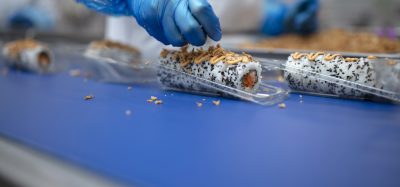HOWTIAN claims highest Reb A yield in industry history
- Like
- Digg
- Del
- Tumblr
- VKontakte
- Buffer
- Love This
- Odnoklassniki
- Meneame
- Blogger
- Amazon
- Yahoo Mail
- Gmail
- AOL
- Newsvine
- HackerNews
- Evernote
- MySpace
- Mail.ru
- Viadeo
- Line
- Comments
- Yummly
- SMS
- Viber
- Telegram
- Subscribe
- Skype
- Facebook Messenger
- Kakao
- LiveJournal
- Yammer
- Edgar
- Fintel
- Mix
- Instapaper
- Copy Link
Posted: 21 October 2022 | Grace Galler | No comments yet
Global wholesale supplier, HOWTIAN, says it’s achieved the highest ever Reb A yield in the industry with up to 12 percent average yield. New Food speaks to Tom Fuzer to find out more…


HOWTIAN says it has achieved the highest Reb A yield in industry history with average yields reaching up to 12 percent this season. This marks a significant turning point, with the cost of stevia approaching parity with artificial sweeteners.
HOWTIAN has been working to produce more affordable stevia for a long time now under a project known as ‘Project Shennong’. This was initiated at the same time different steviol glycoside (the sweet component of stevia) processing technologies began to emerge worldwide.
The project is geared towards lowering the price of stevia but with the significant resolve of not comprising on naturalness.
“The cost of stevia has always been a challenge for the food and beverage manufacturing industry, especially when compared to the cost of artificial sugar substitutes like aspartame,” elaborated the company’s VP of Market Strategy Project, Tom Fuzer. “A key driver of the higher cost is that the typical steviol glycoside yield from stevia plants is rather low. When producing stevia using traditional and natural extraction methods, large quantities of leaf are required to yield a small amount of purified sweetener.”
To overcome this, many producers started to explore other methods like enzymatic modification, bioconversion and fermentation. Although these have helped to reduce costs, Fuzer explained that this has also comprised on the naturalness of stevia to varying degrees.
“New fermentation technologies, for example, don’t even require stevia leaf to produce steviol glycosides,” he added. “This method manufactures a sweetener that may be chemically the same, but it no longer delivers what consumers actually prefer stevia for – its naturalness.” It is because of this that many countries prohibit the glycosides produced by such alternative methods to be labelled as stevia on packaging.
“Project Shennong proves that by investing in breeding technologies and developing stevia variants with exceptionally high Reb A content, you can still achieve cost targets without sacrificing what stevia is all about,” Fuzer continued.
Successful methods for growing stevia
To obtain such a yield, HOWTIAN told New Food that its methods are “simple and transparent” and “all come from nature”.
“There’s no magical secret nor highly guarded laboratories,” Fuzer quipped.
He explained that HOWTIAN works with the world’s leading agricultural experts and scientists in stevia and over the decades has invested in “breeding leaf varieties with outstanding yields of the different glycosides” with the plants then scaled up for mass volume production by introducing them as seedlings to its contract farmers.
This record-breaking landmark for Reb A yields could reassure food and beverage manufactures who have been unable to commit stevia before as a result of cost. According to HOWTIAN, it has been six to 15 times the cost of artificial sweeteners, historically.
Why has stevia been so expensive?
Typically, stevia is an expensive natural sweetener as it has low glycoside yields when extracted naturally. Moreover, when stevia was first being commercialised, there was limited agricultural expertise available, which added to its high product cost.
“Fast forward to today [and] it’s evident the industry has come a long way,” Fuzer told New Food. “China now delivers about 80 percent of the globe’s stevia leaf production, with more aggregated and specialised mass manufacturing advancements helping to greatly improve the cost of stevia.”
The country’s climate has also helped with stevia’s growth, with China now regarded as the home of many world’s leading specialists.
The future of stevia
When asked why HOWTIAN is committed to working with stevia, Fuzer explained that the company saw it as an answer to two long-term megatrends. The first being the need for sugar reduction and the second a desire for clean labelled products. “In other words simple and natural ingredients!”
Regarding the potential increase in the demand for stevia, Fuzer’s outlook was bright: “We anticipate the adoption of stevia to accelerate significantly in the most price sensitive markets, including beverages, snacking and sports nutrition.”
He added: “Artificial sweeteners are on the decline as consumers try to avoid ingredients with names that are too hard to read or that sound too chemical.
“We’re seeing evidence of this in several studies that show more consumers are checking food ingredient labels than ever before. As the 2021 US IFIC study found, 54 percent of consumers avoid foods with chemically sounding ingredients. In addition, Mintel LightSpeed Research has shown 69 percent of consumers consider food with artificial sweeteners as ‘bad for you’. Meanwhile, stevia is widely considered to be a natural and healthy sweetener in markets around the globe.
“We are proud to be at the forefront of the industry and to lead the innovations that’ll drive mass market adoption of natural ingredient solutions like stevia.”
About the author
Tom Fuzer is the Vice President of Market Strategy and the head of marketing for HOWTIAN Group. With over 25 years of experience in senior marketing roles at leading food and beverage companies around the world, he has launched successful innovations across retail, food service and industrial channels. He has been specialising in the sugar and sugar replacement sector for over 10 years. Tom leads the building of HOWTIAN’s business strategy while also providing strategic consulting for its manufacturing customers; this includes advising customers on consumer trends and insights to identify market opportunities and develop new product innovation. He has a MSc in Economics from the University of Pecs and an MBA from Corvinus University.


Related topics
Ingredients, Natural, New product development (NPD), Obesity, Research & development, retail, Supply chain, Technology & Innovation, Trade & Economy, World Food
Related organisations
HOWTIAN, International Food Information Council (IFIC), Mintel









